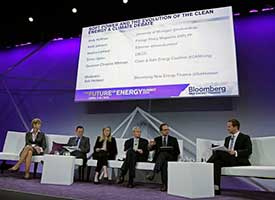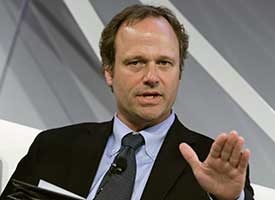I read the news today, oh boy
Andrew Hoffman, a U-M professor who teaches and researches business sustainability at the Stephen M. Ross School of Business, frequently wades into the most controversial waters regarding climate change.
Knowing how and when to do so is something he has figured out through trial and error. Why more academics don’t speak up and what the ground rules should be for those who do is a little hazy.
And as social media democratizes information, how do professors who are incentivized for publishing in scholarly journals participate? It’s a subject Hoffman has studied for the past year, surveying U-M faculty and presenting a series of brown-bag lunch discussions.
“I see so much public debate over issues – pick any one – and it’s not very well informed by scholarly voices,” says Hoffman, director of the Erb Institute for Global Sustainable Enterprise. “Not everyone should or can do this. But as a university, I think we need to start thinking about what it means to be an academic today and the different roles we can play in the knowledge generation and communication business we’re in. I really think the quality of the public debate would be improved.”
Risk vs. reward
One thing working against academics is how they are compensated and incentivized. To obtain tenure, professors need to teach and publish research in academic journals. Writing op-eds, talking to reporters, and advising policymakers is rarely rewarded in academia.
In fact, Hoffman says, professors who appear in the media with some regularity face the risk of being branded as “lightweights” in their field. And because it’s not valued, there isn’t much in the way of resources or training for professors who wish to get involved.
A poll of U-M faculty Nov. 15-28, 2013, found 86 percent of the roughly 300 respondents agreed or strongly agreed that public engagement should be part of an academic’s role. But 56 percent believed it’s not valued by tenure committees, and only 35 percent believed it’s increasingly valued by universities.
Some also responded that they fear the dangers of being misquoted, and 41 percent said media work was time-consuming and distracting.
“We should think about encouraging and training academics on how to engage in a public debate, how to talk to the media, and show them how to select the appropriate outlets,” Hoffman says. “I think the time is right.”
Good timing
One reason the time is right is the way social media balances the playing field when it comes to dispensing knowledge. Hoffman says it’s rivaling academic research in its impact, whether information comes from an organization like the Cato Institute or simply a popular blog.

Hoffman regularly engages with the media and the public to provoke informed dialogue regarding his areas of expertise.
But many professors appear to be wary of social media. Nearly 40 percent of the U-M faculty surveyed say they do not and never will use Twitter for professional work, although 58 percent say they use Twitter and Facebook for personal use.
“Social media is changing our world, and we need to recognize that and figure out what to do about it,” Hoffman says.
Junior faculty are more interested in informing the public debate and using social media, but they have professional obligations first, Hoffman notes.
“We still have an apprentice model and you still have to earn your bones,” he says. “My advice to junior faculty would be to start slowly. Focus on the bread and butter, and get published in the academic journals. But keep your toe in the water. It’s not feasible to tell young professors to check their passions at the door and wait until they get tenure to reignite them.”
Talk to me
Hoffman hopes to get a national conversation going, fueled by his personal interest in raising the quality of public debates. He’s spearheading a national Michigan Meeting conference on the subject, scheduled for May 2015.
“I like to hover between the academic work and practice,” he says. “I wouldn’t be here if I didn’t like doing research for academic journals and teaching. But I also try to bring that to the real world. I don’t want to measure my career just by counting citations. I want to actually have an impact, and I suspect others do, too.”
Hoffman also is a professor of management & organizations; professor of natural resources; and the Holcim (U.S.) Inc. Professor of Sustainable Enterprise.
This story originally appeared at www.bus.umich.edu.





Joseph Middleton - 1953
Although at my age I am not a big user of twitter or facebook, I assure you that I think it would be terrific if the academic world became more involved with the rest of the world vie effective use of the media. Training might be needed, but it would certainly be a worthwhile investment of the time and energy required. To date it’s a shame that some of our brightest feel they should not be involved.
Reply
Richard Layman - 1988
“I don’t understand” why external communication and engagement isn’t considered part of the “service” element of the “teaching, research, and service” mantra that I remember from the days of my involvement as a college student in the LSA Curriculum Committee.
at the beginning of the public Internet, there was a great deal of discussion about what people called “the gift economy” in terms of generating information that was put “on the Internet.” I countered that it was more about the “service” element of the TRM model of research universities.
The broader issue is the generalized failure of “the real world” to apply theory as generated by academia to inform problems and issues so that they can be addressed more thoroughly and successfully.
As an urban planner and writer, I read academic literature all the time to inform my understanding of the problems or questions that I am engaged in.
But I know this is unusual–but it something “built into me” from my days at UM, and being able to wander the periodical stacks at the Hatcher Library, or being able to use the various other libraries across the campus (like Public Health or Rackham) when I was writing and researching for various class papers.
So it comes down to developing better communities of practice that engage practitioners, researchers, and the interested public, so that knowledge is captured, codified, analyzed, interpreted, and used in ways for societal betterment.
We are a long ways from that point, at least as it relates to urban revitalization…
Reply
Alex Janevski - 2012
Professors absolutely should engage in public debate (though it need not be a “debate”). The success of the recent “Cosmos” reboot shows the public interest in academic discovery. And this is hardly a new phenomenon, as the ongoing Royal Institution Christmas Lectures, started in 1825 by Michael Faraday, can attest to.
The U-M mission statement:
“The mission of the University of Michigan is to serve the people of Michigan and the world through preeminence in creating, communicating, preserving and applying knowledge, art and academic values, and in developing leaders and citizens who will challenge the present and enrich the future.”
Not only should professors engage the public, it’s their very mission, to do so in a way that serves the people of Michigan, the world, and “through preeminence in… communicating.”
Reply
Kai Petainen
I think it’s important to put thoughts into action. It’s important to be involved in academics, but it is also important to go beyond that as it’s important to be ‘boundaryless’ and get involved outside of academics. And if you do that, then it’s possible to create a ‘positive’ impact and improve the quality of living for others around us. We live in Ann Arbor, and if more academics were to help the citizens of Ann Arbor and the city of Ann Arbor, then I think a lot could be accomplished. We are already seeing some ripple effects as positive and ethical business practices are being promoted to city council and we’re seeing better transparency and better corporate governance. A lot more could be done to improve our community, but it involves courage and time. Sometimes academics only help when they are paid, and sometimes academics don’t have the courage to speak. If we want to make an improvement to our quality of living, then it’s important to volunteer some time and effort and it is important to have the courage to speak and to be heard.
I am one of the few who has the courage to speak and changes have been made. I’ve already watched improvements within the city as they adopt (better) positive business practices, better transparency, and better corporate governance.
Reply
Patrick Cardiff - 1990
I don’t think it’s surprising if a professor with a highly intense understanding of a limited reference frame balks at open-ended questions.
Nor is it simply a question of theory versus action.
Not all problems require sophisticated methods to solve, and I think sometimes people hide behind arcana when they know that straight answers will be misinterpreted.
Education is sunk cost until it’s disseminated.
Consider global warming: We need leaders, not eggheads.
Reply
R. Salvatore - 1990
Indeed, it should not just be pick-up truck drivers and plumbers who speak out.
Reply
John Malcolm - 1972
More learned discourse is needed, as is keeping in mind that there is a difference between debate and pontification, and that while something can be convincing in argument it can be wrong in fact.
Reply
Name Withheld - 1993
I am an academic, and am comfortable speaking out. But some of our state legislators have threatened to cut funding or even eliminate our program and others around the state because their view is different than ours. For me, that’s the real obstacle to both academic freedom and academic participation in public debate.
Reply
Jim Hallett - 1972
I am all for having many informed voices discussing any issue. However, many academics tend to be both condescending when talking to others that they infer are “less scholarly” than they, and so many just push a “progressive”/socialist agenda, since that supports their role as academics and how they are paid. Many of the conclusions drawn by “scholarly research” have been shown to be frauds, since the conclusion was already dictated by the provider of the grant.
Reply
Kelly Van Rijn - 1984
What difference does it make? The vast majority of Michigan professors are liberals living in a fantasy, academic world with little or no grounding in reality. Perhaps if the discussion was more balanced, academia might be able to add something useful to the bigger discussion. Instead, Michigan just piles on to the left wing bandwagon.
Reply
Joanne Kantrowitz - 1953(U of Chicago M.a. PH.D. 1967
As witness the trustees denying the appointment of an outspoken professor just 2 weeks before the term started at the University of Illinois. And the failure of many professors (most?) to speak out against the exploitation of adjunct faculty. Nationally, 66% of undergraduates are taught by temporaries.
Reply